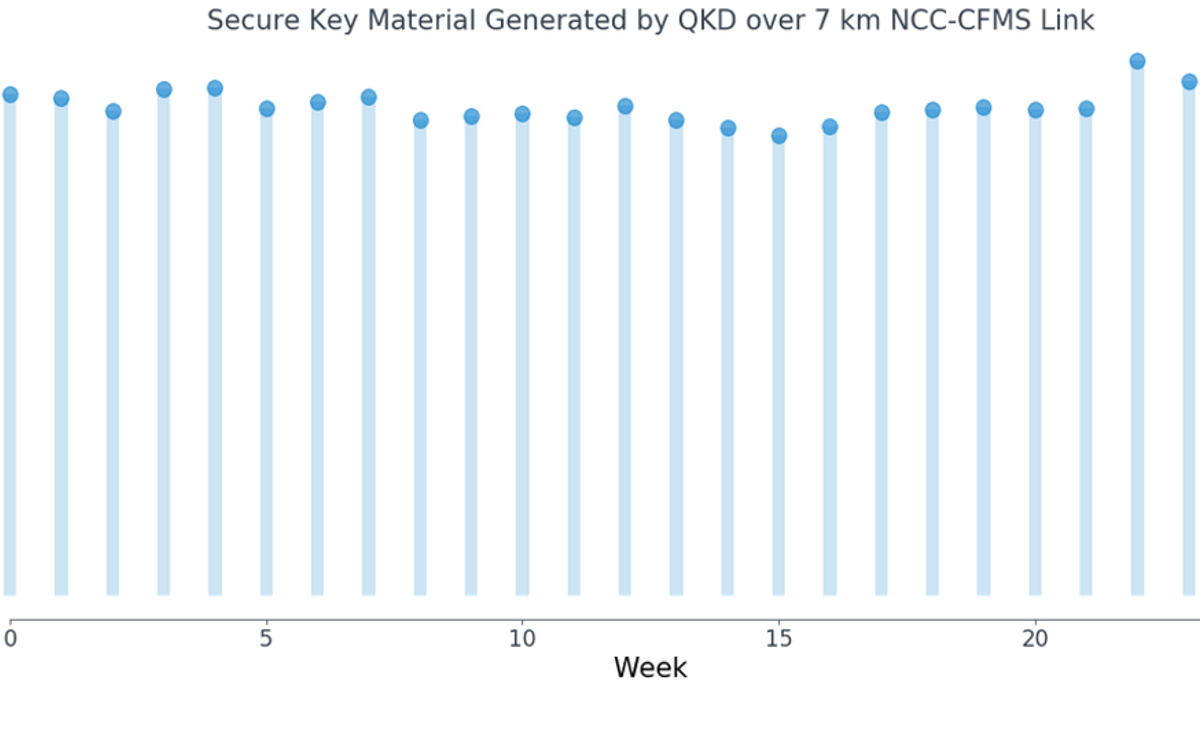
First Quantum Key Distribution Trial for Manufacturing Passes Test
The UK’s first industrial quantum-secure network, created by the DETI partnership, BT and Toshiba Europe Ltd, has successfully shared live data for remote manufacturing using Quantum Key Distribution (QKD), over a 2 month trial period. This is the first time the capability has been demonstrated using ‘off the shelf’ components and is the first phase of a programme exploring the practical application of this technology to accelerate the shift to smart factories.
The processing power of quantum computing, when it comes onstream, will challenge the security of today’s encryption technologies. This has serious implications for design and manufacturing industries which rely on ultra-secure data transmission. QKD has been identified as one of the solutions to secure communications, but its suitability for real-world manufacturing applications has been largely untested – until now.
The DETI (Digital Engineering Technology & Innovation) programme team, which takes novel digital technologies out of the lab and tests them on the factory floor, worked with BT and Toshiba to install a quantum-secure network, between the National Composites Centre (NCC) and the Centre for Modelling & Simulation (CFMS), near Bristol, using BT Openreach’s ‘standard’ fibre optic infrastructure.
The trial routed data across a dedicated connection, a 7km long QKD enabled encrypted tunnel, between the NCC and CFMS sites, to enable the remote operation of the NCC’s composites Overbraider machine – a highly complex device that weaves strands of carbon fibre from 288 separate spools to create precision hollow composites components, such as aircraft engine blades.
In the trial, the NCC and CFMS teams shared production data and quality-critical measurements using Toshiba’s QKD system to transmit encryption ‘keys’ – a stream of single encoded photons. This can distribute thousands of cryptographic keys per second, making it possible for both the data and the quantum keys to be transmitted using the same fibre, eliminating the need for costly dedicated infrastructure.
Over the course of the Overbraider trial, the QKD system generated on average, between 0.7 and 0.8 terabit (Tbit) of secure key each week [Figure 1], with the link operational for six months.
Marc Funnell, Director of Digital & DETI at the NCC, said:
“If the UK is to unlock its digital engineering capability and smarter products, the secure communication of data inside and outside of the factory will be critical to success; Quantum is pushing us to think differently about how we do this.
“Congratulations to the team who have taken the first step, by successfully demonstrating the capability of a QKD enabled link, built on commercially available solutions within six months.
“Working with our DETI partners and the High Value Manufacturing Catapult, we will now look to extend the scope of the trial and integrate QKD into our 5G test bed bringing this technology closer to the machines and IoT devices. As per NCSC guidance, as quantum-safe cryptography mechanisms mature, we will implement this alongside our QKD deployment.”
Professor Andrew Lord, Head of Optical technology, BT, said:
“BT is proud, together with Toshiba, to supply a complete QKD-based security solution to NCC, and our commercial design, using Openreach fibre access products, is entirely in keeping with NCC’s ambitions towards state of the art security, fully integrated into their existing communications network.”
Andrew Shields, Head of Quantum Technology Division, Toshiba Europe Ltd, said:
“Working with the NCC, CFMS and BT has enabled us to demonstrate our secure quantum communication technology within smart manufacturing applications. By multiplexing the quantum signals on ordinary data carrying fibres, we were able to integrate QKD with a standard BT fibre product, demonstrating that QKD is now ready to be deployed without expensive, dedicated infrastructure.”
Nathan Harper, Head of CFMS Engineering Compute Services, said:
“The project demonstrated how QKD can be used in real-world situations. Digital engineering offers significant benefits across a range of industry sectors, but these can only be achieved if large amounts of digital data can be shared securely. Quantum computing has the potential to undermine current IT encryption methods, but this project demonstrates that QKD is ready for commercial use and we can continue to share sensitive data across public networks.”
The quantum enabled link was established as part of the DETI test beds funded by the West of England Combined Authority and using the quantum solution installed by BT and Toshiba supported by Innovate UK’s AQuaSeC project.
Further information on the QKD trial can be found on the DETI website here.
Organisations interested in learning more about the quantum programme or accessing the 5G-ENCODE and DETI and test beds can email [email protected] for further information.
<ENDS>
Media Enquiries:
Richard Knight, Mettle Communications – [email protected] – 07725 996625

